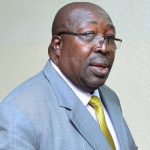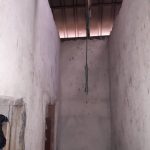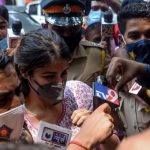A Ugandan national army soldier has shot and killed a government minister he was guarding.
Retired Colonel Charles Okello Engola, who was the deputy minister for gender and labour, was shot at his home on Tuesday morning.
It is not yet clear whether there was an argument between the soldier and Col Engola.
The soldier, yet to be officially identified, then shot himself dead.
Before turning the gun on himself, some eyewitness said the soldier walked around the neighbourhood shooting in the air.
Initial reports suggest a number of people may be injured and videos on social media showed locals gathering at the scene in shock.
Col Engola was a senior government official, and had previously served as a deputy minister for defence.
The Speaker of Uganda’s parliament confirmed Col Engola’s death in a short statement while presiding over the morning session.
“This morning I received sad news that Hon Engola has been shot by his bodyguard and after, shot himself. May his soul rest in peace. That was God’s plan. We can’t change anything,” Anita Among told MPs on Tuesday.
Warring Factions Agree on Ceasefire in Sudan, to start Thursday
Sudan’s warring factions have agreed in principle to a seven-day ceasefire from Thursday, neighbouring South Sudan announced, as more air raids and shooting in the Khartoum region disrupted the latest short-term truce.
A statement released on Tuesday by the foreign ministry of South Sudan, which had offered to mediate in the conflict, said its President Salva Kiir stressed the importance of a longer truce and of naming envoys to peace talks, to which both sides had agreed.
The credibility of the reported May 4-11 deal ceasefire deal between Sudanese army chief General Abdel Fattah al-Burhan and paramilitary Rapid Support forces (RSF) leader General Mohamed Hamdan “Hemedti” Dagalo was unclear, given the rampant violations that undermined previous agreements running from 24 to 72 hours.
“Previously, we have had a three-day ceasefire followed by another three-day ceasefire, which was followed by an extension of the three-day ceasefire. This one is supposed to last for seven days. Both sides have agreed that they will have a ceasefire and that they will not fire unless they are fired at or unless there are military movements.
Sudan’s war has forced 100,000 people to flee over its borders and fighting, now in its third week, is creating a humanitarian crisis, UN officials said earlier on Tuesday.
The conflict risks developing into a broader disaster as Sudan’s neighbours deal with a refugee crunch and fighting hampers aid deliveries in a nation where two-thirds of the people already rely on some outside assistance.
Egyptian President Abdel Fattah el-Sisi said Cairo would provide support for dialogue in Sudan between the rival factions, but was also “being careful about not interfering in their domestic matters”.
“The entire region could be affected,” he said in an interview with a Japanese newspaper on Tuesday, as an envoy from Sudan’s army chief, who leads one of the warring sides, met Egyptian officials in Cairo.
United Nations officials had said UN aid chief Martin Griffiths aimed to visit Sudan on Tuesday but the timing was still to be confirmed.
The UN World Food Programme said on Monday it was resuming work in the safer parts of the country after a pause earlier in the conflict, in which some WFP staff were killed.
“The risk is that this is not just going to be a Sudan crisis, it’s going to be a regional crisis,” said Michael Dunford, the WFP’s East Africa director.
The commanders of the army and RSF, who had shared power as part of an internationally backed transition towards free elections and civilian government, have shown no sign of backing down, yet neither seems able to secure a quick victory.
That has raised the spectre of a prolonged conflict that could draw in outside powers.
A Ugandan national army soldier has shot and killed a government minister he was guarding.
Retired Colonel Charles Okello Engola, who was the deputy minister for gender and labour, was shot at his home on Tuesday morning.
It is not yet clear whether there was an argument between the soldier and Col Engola.
The soldier, yet to be officially identified, then shot himself dead.
Before turning the gun on himself, some eyewitness said the soldier walked around the neighbourhood shooting in the air.
Initial reports suggest a number of people may be injured and videos on social media showed locals gathering at the scene in shock.
Col Engola was a senior government official, and had previously served as a deputy minister for defence.
The Speaker of Uganda’s parliament confirmed Col Engola’s death in a short statement while presiding over the morning session.
“This morning I received sad news that Hon Engola has been shot by his bodyguard and after, shot himself. May his soul rest in peace. That was God’s plan. We can’t change anything,” Anita Among told MPs on Tuesday.
Warring Factions Agree on Ceasefire in Sudan, to start Thursday
Sudan’s warring factions have agreed in principle to a seven-day ceasefire from Thursday, neighbouring South Sudan announced, as more air raids and shooting in the Khartoum region disrupted the latest short-term truce.
A statement released on Tuesday by the foreign ministry of South Sudan, which had offered to mediate in the conflict, said its President Salva Kiir stressed the importance of a longer truce and of naming envoys to peace talks, to which both sides had agreed.
The credibility of the reported May 4-11 deal ceasefire deal between Sudanese army chief General Abdel Fattah al-Burhan and paramilitary Rapid Support forces (RSF) leader General Mohamed Hamdan “Hemedti” Dagalo was unclear, given the rampant violations that undermined previous agreements running from 24 to 72 hours.
“Previously, we have had a three-day ceasefire followed by another three-day ceasefire, which was followed by an extension of the three-day ceasefire. This one is supposed to last for seven days. Both sides have agreed that they will have a ceasefire and that they will not fire unless they are fired at or unless there are military movements.
Sudan’s war has forced 100,000 people to flee over its borders and fighting, now in its third week, is creating a humanitarian crisis, UN officials said earlier on Tuesday.
The conflict risks developing into a broader disaster as Sudan’s neighbours deal with a refugee crunch and fighting hampers aid deliveries in a nation where two-thirds of the people already rely on some outside assistance.
Egyptian President Abdel Fattah el-Sisi said Cairo would provide support for dialogue in Sudan between the rival factions, but was also “being careful about not interfering in their domestic matters”.
“The entire region could be affected,” he said in an interview with a Japanese newspaper on Tuesday, as an envoy from Sudan’s army chief, who leads one of the warring sides, met Egyptian officials in Cairo.
United Nations officials had said UN aid chief Martin Griffiths aimed to visit Sudan on Tuesday but the timing was still to be confirmed.
The UN World Food Programme said on Monday it was resuming work in the safer parts of the country after a pause earlier in the conflict, in which some WFP staff were killed.
“The risk is that this is not just going to be a Sudan crisis, it’s going to be a regional crisis,” said Michael Dunford, the WFP’s East Africa director.
The commanders of the army and RSF, who had shared power as part of an internationally backed transition towards free elections and civilian government, have shown no sign of backing down, yet neither seems able to secure a quick victory.
That has raised the spectre of a prolonged conflict that could draw in outside powers.
A Ugandan national army soldier has shot and killed a government minister he was guarding.
Retired Colonel Charles Okello Engola, who was the deputy minister for gender and labour, was shot at his home on Tuesday morning.
It is not yet clear whether there was an argument between the soldier and Col Engola.
The soldier, yet to be officially identified, then shot himself dead.
Before turning the gun on himself, some eyewitness said the soldier walked around the neighbourhood shooting in the air.
Initial reports suggest a number of people may be injured and videos on social media showed locals gathering at the scene in shock.
Col Engola was a senior government official, and had previously served as a deputy minister for defence.
The Speaker of Uganda’s parliament confirmed Col Engola’s death in a short statement while presiding over the morning session.
“This morning I received sad news that Hon Engola has been shot by his bodyguard and after, shot himself. May his soul rest in peace. That was God’s plan. We can’t change anything,” Anita Among told MPs on Tuesday.
Warring Factions Agree on Ceasefire in Sudan, to start Thursday
Sudan’s warring factions have agreed in principle to a seven-day ceasefire from Thursday, neighbouring South Sudan announced, as more air raids and shooting in the Khartoum region disrupted the latest short-term truce.
A statement released on Tuesday by the foreign ministry of South Sudan, which had offered to mediate in the conflict, said its President Salva Kiir stressed the importance of a longer truce and of naming envoys to peace talks, to which both sides had agreed.
The credibility of the reported May 4-11 deal ceasefire deal between Sudanese army chief General Abdel Fattah al-Burhan and paramilitary Rapid Support forces (RSF) leader General Mohamed Hamdan “Hemedti” Dagalo was unclear, given the rampant violations that undermined previous agreements running from 24 to 72 hours.
“Previously, we have had a three-day ceasefire followed by another three-day ceasefire, which was followed by an extension of the three-day ceasefire. This one is supposed to last for seven days. Both sides have agreed that they will have a ceasefire and that they will not fire unless they are fired at or unless there are military movements.
Sudan’s war has forced 100,000 people to flee over its borders and fighting, now in its third week, is creating a humanitarian crisis, UN officials said earlier on Tuesday.
The conflict risks developing into a broader disaster as Sudan’s neighbours deal with a refugee crunch and fighting hampers aid deliveries in a nation where two-thirds of the people already rely on some outside assistance.
Egyptian President Abdel Fattah el-Sisi said Cairo would provide support for dialogue in Sudan between the rival factions, but was also “being careful about not interfering in their domestic matters”.
“The entire region could be affected,” he said in an interview with a Japanese newspaper on Tuesday, as an envoy from Sudan’s army chief, who leads one of the warring sides, met Egyptian officials in Cairo.
United Nations officials had said UN aid chief Martin Griffiths aimed to visit Sudan on Tuesday but the timing was still to be confirmed.
The UN World Food Programme said on Monday it was resuming work in the safer parts of the country after a pause earlier in the conflict, in which some WFP staff were killed.
“The risk is that this is not just going to be a Sudan crisis, it’s going to be a regional crisis,” said Michael Dunford, the WFP’s East Africa director.
The commanders of the army and RSF, who had shared power as part of an internationally backed transition towards free elections and civilian government, have shown no sign of backing down, yet neither seems able to secure a quick victory.
That has raised the spectre of a prolonged conflict that could draw in outside powers.
A Ugandan national army soldier has shot and killed a government minister he was guarding.
Retired Colonel Charles Okello Engola, who was the deputy minister for gender and labour, was shot at his home on Tuesday morning.
It is not yet clear whether there was an argument between the soldier and Col Engola.
The soldier, yet to be officially identified, then shot himself dead.
Before turning the gun on himself, some eyewitness said the soldier walked around the neighbourhood shooting in the air.
Initial reports suggest a number of people may be injured and videos on social media showed locals gathering at the scene in shock.
Col Engola was a senior government official, and had previously served as a deputy minister for defence.
The Speaker of Uganda’s parliament confirmed Col Engola’s death in a short statement while presiding over the morning session.
“This morning I received sad news that Hon Engola has been shot by his bodyguard and after, shot himself. May his soul rest in peace. That was God’s plan. We can’t change anything,” Anita Among told MPs on Tuesday.
Warring Factions Agree on Ceasefire in Sudan, to start Thursday
Sudan’s warring factions have agreed in principle to a seven-day ceasefire from Thursday, neighbouring South Sudan announced, as more air raids and shooting in the Khartoum region disrupted the latest short-term truce.
A statement released on Tuesday by the foreign ministry of South Sudan, which had offered to mediate in the conflict, said its President Salva Kiir stressed the importance of a longer truce and of naming envoys to peace talks, to which both sides had agreed.
The credibility of the reported May 4-11 deal ceasefire deal between Sudanese army chief General Abdel Fattah al-Burhan and paramilitary Rapid Support forces (RSF) leader General Mohamed Hamdan “Hemedti” Dagalo was unclear, given the rampant violations that undermined previous agreements running from 24 to 72 hours.
“Previously, we have had a three-day ceasefire followed by another three-day ceasefire, which was followed by an extension of the three-day ceasefire. This one is supposed to last for seven days. Both sides have agreed that they will have a ceasefire and that they will not fire unless they are fired at or unless there are military movements.
Sudan’s war has forced 100,000 people to flee over its borders and fighting, now in its third week, is creating a humanitarian crisis, UN officials said earlier on Tuesday.
The conflict risks developing into a broader disaster as Sudan’s neighbours deal with a refugee crunch and fighting hampers aid deliveries in a nation where two-thirds of the people already rely on some outside assistance.
Egyptian President Abdel Fattah el-Sisi said Cairo would provide support for dialogue in Sudan between the rival factions, but was also “being careful about not interfering in their domestic matters”.
“The entire region could be affected,” he said in an interview with a Japanese newspaper on Tuesday, as an envoy from Sudan’s army chief, who leads one of the warring sides, met Egyptian officials in Cairo.
United Nations officials had said UN aid chief Martin Griffiths aimed to visit Sudan on Tuesday but the timing was still to be confirmed.
The UN World Food Programme said on Monday it was resuming work in the safer parts of the country after a pause earlier in the conflict, in which some WFP staff were killed.
“The risk is that this is not just going to be a Sudan crisis, it’s going to be a regional crisis,” said Michael Dunford, the WFP’s East Africa director.
The commanders of the army and RSF, who had shared power as part of an internationally backed transition towards free elections and civilian government, have shown no sign of backing down, yet neither seems able to secure a quick victory.
That has raised the spectre of a prolonged conflict that could draw in outside powers.
A Ugandan national army soldier has shot and killed a government minister he was guarding.
Retired Colonel Charles Okello Engola, who was the deputy minister for gender and labour, was shot at his home on Tuesday morning.
It is not yet clear whether there was an argument between the soldier and Col Engola.
The soldier, yet to be officially identified, then shot himself dead.
Before turning the gun on himself, some eyewitness said the soldier walked around the neighbourhood shooting in the air.
Initial reports suggest a number of people may be injured and videos on social media showed locals gathering at the scene in shock.
Col Engola was a senior government official, and had previously served as a deputy minister for defence.
The Speaker of Uganda’s parliament confirmed Col Engola’s death in a short statement while presiding over the morning session.
“This morning I received sad news that Hon Engola has been shot by his bodyguard and after, shot himself. May his soul rest in peace. That was God’s plan. We can’t change anything,” Anita Among told MPs on Tuesday.
Warring Factions Agree on Ceasefire in Sudan, to start Thursday
Sudan’s warring factions have agreed in principle to a seven-day ceasefire from Thursday, neighbouring South Sudan announced, as more air raids and shooting in the Khartoum region disrupted the latest short-term truce.
A statement released on Tuesday by the foreign ministry of South Sudan, which had offered to mediate in the conflict, said its President Salva Kiir stressed the importance of a longer truce and of naming envoys to peace talks, to which both sides had agreed.
The credibility of the reported May 4-11 deal ceasefire deal between Sudanese army chief General Abdel Fattah al-Burhan and paramilitary Rapid Support forces (RSF) leader General Mohamed Hamdan “Hemedti” Dagalo was unclear, given the rampant violations that undermined previous agreements running from 24 to 72 hours.
“Previously, we have had a three-day ceasefire followed by another three-day ceasefire, which was followed by an extension of the three-day ceasefire. This one is supposed to last for seven days. Both sides have agreed that they will have a ceasefire and that they will not fire unless they are fired at or unless there are military movements.
Sudan’s war has forced 100,000 people to flee over its borders and fighting, now in its third week, is creating a humanitarian crisis, UN officials said earlier on Tuesday.
The conflict risks developing into a broader disaster as Sudan’s neighbours deal with a refugee crunch and fighting hampers aid deliveries in a nation where two-thirds of the people already rely on some outside assistance.
Egyptian President Abdel Fattah el-Sisi said Cairo would provide support for dialogue in Sudan between the rival factions, but was also “being careful about not interfering in their domestic matters”.
“The entire region could be affected,” he said in an interview with a Japanese newspaper on Tuesday, as an envoy from Sudan’s army chief, who leads one of the warring sides, met Egyptian officials in Cairo.
United Nations officials had said UN aid chief Martin Griffiths aimed to visit Sudan on Tuesday but the timing was still to be confirmed.
The UN World Food Programme said on Monday it was resuming work in the safer parts of the country after a pause earlier in the conflict, in which some WFP staff were killed.
“The risk is that this is not just going to be a Sudan crisis, it’s going to be a regional crisis,” said Michael Dunford, the WFP’s East Africa director.
The commanders of the army and RSF, who had shared power as part of an internationally backed transition towards free elections and civilian government, have shown no sign of backing down, yet neither seems able to secure a quick victory.
That has raised the spectre of a prolonged conflict that could draw in outside powers.
A Ugandan national army soldier has shot and killed a government minister he was guarding.
Retired Colonel Charles Okello Engola, who was the deputy minister for gender and labour, was shot at his home on Tuesday morning.
It is not yet clear whether there was an argument between the soldier and Col Engola.
The soldier, yet to be officially identified, then shot himself dead.
Before turning the gun on himself, some eyewitness said the soldier walked around the neighbourhood shooting in the air.
Initial reports suggest a number of people may be injured and videos on social media showed locals gathering at the scene in shock.
Col Engola was a senior government official, and had previously served as a deputy minister for defence.
The Speaker of Uganda’s parliament confirmed Col Engola’s death in a short statement while presiding over the morning session.
“This morning I received sad news that Hon Engola has been shot by his bodyguard and after, shot himself. May his soul rest in peace. That was God’s plan. We can’t change anything,” Anita Among told MPs on Tuesday.
Warring Factions Agree on Ceasefire in Sudan, to start Thursday
Sudan’s warring factions have agreed in principle to a seven-day ceasefire from Thursday, neighbouring South Sudan announced, as more air raids and shooting in the Khartoum region disrupted the latest short-term truce.
A statement released on Tuesday by the foreign ministry of South Sudan, which had offered to mediate in the conflict, said its President Salva Kiir stressed the importance of a longer truce and of naming envoys to peace talks, to which both sides had agreed.
The credibility of the reported May 4-11 deal ceasefire deal between Sudanese army chief General Abdel Fattah al-Burhan and paramilitary Rapid Support forces (RSF) leader General Mohamed Hamdan “Hemedti” Dagalo was unclear, given the rampant violations that undermined previous agreements running from 24 to 72 hours.
“Previously, we have had a three-day ceasefire followed by another three-day ceasefire, which was followed by an extension of the three-day ceasefire. This one is supposed to last for seven days. Both sides have agreed that they will have a ceasefire and that they will not fire unless they are fired at or unless there are military movements.
Sudan’s war has forced 100,000 people to flee over its borders and fighting, now in its third week, is creating a humanitarian crisis, UN officials said earlier on Tuesday.
The conflict risks developing into a broader disaster as Sudan’s neighbours deal with a refugee crunch and fighting hampers aid deliveries in a nation where two-thirds of the people already rely on some outside assistance.
Egyptian President Abdel Fattah el-Sisi said Cairo would provide support for dialogue in Sudan between the rival factions, but was also “being careful about not interfering in their domestic matters”.
“The entire region could be affected,” he said in an interview with a Japanese newspaper on Tuesday, as an envoy from Sudan’s army chief, who leads one of the warring sides, met Egyptian officials in Cairo.
United Nations officials had said UN aid chief Martin Griffiths aimed to visit Sudan on Tuesday but the timing was still to be confirmed.
The UN World Food Programme said on Monday it was resuming work in the safer parts of the country after a pause earlier in the conflict, in which some WFP staff were killed.
“The risk is that this is not just going to be a Sudan crisis, it’s going to be a regional crisis,” said Michael Dunford, the WFP’s East Africa director.
The commanders of the army and RSF, who had shared power as part of an internationally backed transition towards free elections and civilian government, have shown no sign of backing down, yet neither seems able to secure a quick victory.
That has raised the spectre of a prolonged conflict that could draw in outside powers.
A Ugandan national army soldier has shot and killed a government minister he was guarding.
Retired Colonel Charles Okello Engola, who was the deputy minister for gender and labour, was shot at his home on Tuesday morning.
It is not yet clear whether there was an argument between the soldier and Col Engola.
The soldier, yet to be officially identified, then shot himself dead.
Before turning the gun on himself, some eyewitness said the soldier walked around the neighbourhood shooting in the air.
Initial reports suggest a number of people may be injured and videos on social media showed locals gathering at the scene in shock.
Col Engola was a senior government official, and had previously served as a deputy minister for defence.
The Speaker of Uganda’s parliament confirmed Col Engola’s death in a short statement while presiding over the morning session.
“This morning I received sad news that Hon Engola has been shot by his bodyguard and after, shot himself. May his soul rest in peace. That was God’s plan. We can’t change anything,” Anita Among told MPs on Tuesday.
Warring Factions Agree on Ceasefire in Sudan, to start Thursday
Sudan’s warring factions have agreed in principle to a seven-day ceasefire from Thursday, neighbouring South Sudan announced, as more air raids and shooting in the Khartoum region disrupted the latest short-term truce.
A statement released on Tuesday by the foreign ministry of South Sudan, which had offered to mediate in the conflict, said its President Salva Kiir stressed the importance of a longer truce and of naming envoys to peace talks, to which both sides had agreed.
The credibility of the reported May 4-11 deal ceasefire deal between Sudanese army chief General Abdel Fattah al-Burhan and paramilitary Rapid Support forces (RSF) leader General Mohamed Hamdan “Hemedti” Dagalo was unclear, given the rampant violations that undermined previous agreements running from 24 to 72 hours.
“Previously, we have had a three-day ceasefire followed by another three-day ceasefire, which was followed by an extension of the three-day ceasefire. This one is supposed to last for seven days. Both sides have agreed that they will have a ceasefire and that they will not fire unless they are fired at or unless there are military movements.
Sudan’s war has forced 100,000 people to flee over its borders and fighting, now in its third week, is creating a humanitarian crisis, UN officials said earlier on Tuesday.
The conflict risks developing into a broader disaster as Sudan’s neighbours deal with a refugee crunch and fighting hampers aid deliveries in a nation where two-thirds of the people already rely on some outside assistance.
Egyptian President Abdel Fattah el-Sisi said Cairo would provide support for dialogue in Sudan between the rival factions, but was also “being careful about not interfering in their domestic matters”.
“The entire region could be affected,” he said in an interview with a Japanese newspaper on Tuesday, as an envoy from Sudan’s army chief, who leads one of the warring sides, met Egyptian officials in Cairo.
United Nations officials had said UN aid chief Martin Griffiths aimed to visit Sudan on Tuesday but the timing was still to be confirmed.
The UN World Food Programme said on Monday it was resuming work in the safer parts of the country after a pause earlier in the conflict, in which some WFP staff were killed.
“The risk is that this is not just going to be a Sudan crisis, it’s going to be a regional crisis,” said Michael Dunford, the WFP’s East Africa director.
The commanders of the army and RSF, who had shared power as part of an internationally backed transition towards free elections and civilian government, have shown no sign of backing down, yet neither seems able to secure a quick victory.
That has raised the spectre of a prolonged conflict that could draw in outside powers.
A Ugandan national army soldier has shot and killed a government minister he was guarding.
Retired Colonel Charles Okello Engola, who was the deputy minister for gender and labour, was shot at his home on Tuesday morning.
It is not yet clear whether there was an argument between the soldier and Col Engola.
The soldier, yet to be officially identified, then shot himself dead.
Before turning the gun on himself, some eyewitness said the soldier walked around the neighbourhood shooting in the air.
Initial reports suggest a number of people may be injured and videos on social media showed locals gathering at the scene in shock.
Col Engola was a senior government official, and had previously served as a deputy minister for defence.
The Speaker of Uganda’s parliament confirmed Col Engola’s death in a short statement while presiding over the morning session.
“This morning I received sad news that Hon Engola has been shot by his bodyguard and after, shot himself. May his soul rest in peace. That was God’s plan. We can’t change anything,” Anita Among told MPs on Tuesday.
Warring Factions Agree on Ceasefire in Sudan, to start Thursday
Sudan’s warring factions have agreed in principle to a seven-day ceasefire from Thursday, neighbouring South Sudan announced, as more air raids and shooting in the Khartoum region disrupted the latest short-term truce.
A statement released on Tuesday by the foreign ministry of South Sudan, which had offered to mediate in the conflict, said its President Salva Kiir stressed the importance of a longer truce and of naming envoys to peace talks, to which both sides had agreed.
The credibility of the reported May 4-11 deal ceasefire deal between Sudanese army chief General Abdel Fattah al-Burhan and paramilitary Rapid Support forces (RSF) leader General Mohamed Hamdan “Hemedti” Dagalo was unclear, given the rampant violations that undermined previous agreements running from 24 to 72 hours.
“Previously, we have had a three-day ceasefire followed by another three-day ceasefire, which was followed by an extension of the three-day ceasefire. This one is supposed to last for seven days. Both sides have agreed that they will have a ceasefire and that they will not fire unless they are fired at or unless there are military movements.
Sudan’s war has forced 100,000 people to flee over its borders and fighting, now in its third week, is creating a humanitarian crisis, UN officials said earlier on Tuesday.
The conflict risks developing into a broader disaster as Sudan’s neighbours deal with a refugee crunch and fighting hampers aid deliveries in a nation where two-thirds of the people already rely on some outside assistance.
Egyptian President Abdel Fattah el-Sisi said Cairo would provide support for dialogue in Sudan between the rival factions, but was also “being careful about not interfering in their domestic matters”.
“The entire region could be affected,” he said in an interview with a Japanese newspaper on Tuesday, as an envoy from Sudan’s army chief, who leads one of the warring sides, met Egyptian officials in Cairo.
United Nations officials had said UN aid chief Martin Griffiths aimed to visit Sudan on Tuesday but the timing was still to be confirmed.
The UN World Food Programme said on Monday it was resuming work in the safer parts of the country after a pause earlier in the conflict, in which some WFP staff were killed.
“The risk is that this is not just going to be a Sudan crisis, it’s going to be a regional crisis,” said Michael Dunford, the WFP’s East Africa director.
The commanders of the army and RSF, who had shared power as part of an internationally backed transition towards free elections and civilian government, have shown no sign of backing down, yet neither seems able to secure a quick victory.
That has raised the spectre of a prolonged conflict that could draw in outside powers.














